当前位置: Language Tips> 合作专区> 英语学习专栏
想到在家工作更有效率,更灵活,打扰更少等诸多好处,我便将工作地点从学校的办公室转移到了家里的地下室。可是,接下来我却发现了在家办公的诸多不便……

By Thomas Klassen
瑜箬 选注
When I started working from home some months ago, I had not anticipated[2] the challenges involved.
The first was to tell people that I am working from home. I’ve had to explain my work arrangement to my neighbours, who wondered why I was raking leaves or shovelling snow in the mid-afternoon.[3] I’ve described it to door-to-door canvassers[4], relatives, friends, the gas meter reader, the mail carrier and the parents of children in the kindergarten school yard.
The people who’ve had the most difficulty in understanding my new work setup are my family. My five-year-old twins, Claire and Alexander, keep asking, with some apprehension[5], “Daddy, why don’t you go to work?” My response, “But I am working, just from home,” completely baffles[6] them and they gaze at me with an expression unique to children: “Daddy says the funniest things.”
The second challenge has been the additional demands, mostly from my wife. Her phone calls from her office invariably begin with the four words I’ve come to dread: “Since you’re at home ...”[7] Her assumption, and that of others, is that since I’m at home between 9 and 5, I can easily take care of last-minute shopping, arrange for deliveries and drop-offs, orchestrate play dates for the twins, and respond to financial, medical, educational and home maintenance matters for our family.[8]
The result is that by working from home I’ve taken on a host of new duties, in addition to those mandated[9] by my employer. Over the past six months, our home has acquired a new roof, an upgraded electrical system and a long list of interior and exterior home improvements.
The third and most complex challenge are the expectations of my children. Claire and Alexander seem unable to grasp that having a stay-at-home dad is not the same as having a gainfully employed stay-at-home dad. Invariably they need to consult with me on any disagreement or matter that arises after returning home from their daily 2.5 hours of morning senior kindergarten.
I imagined that a few words of wisdom from me would quickly settle them back to their routine with our caregiver[10]. However, I came to realize that resolving a dispute over the ownership of a particular pencil, of the 200 in our home, is akin to taking a case to the Supreme Court of Canada.[11] It takes a lot of time, and any outcome can and will be appealed[12].
The fourth challenge, at first trivial but less so as time passed, is that my basement office, which was to be my sacrosanct work space, became a storage room.[13] My real office (as everyone in my family calls it) at York University is a marvel of cleanliness and organization. My home office—which I suppose everyone saw as not being real—is now a warren of not-quite discarded or returned items: boxes of old books and clothes, long-forgotten toys, diseased plants, sports equipment and sundry unused or defective home-repair materials.[14]
Claire and Alexander see the space as an extension[15] of their playroom, especially suited for hide-and-seek, with the added feature of expensive electronic equipment.
Over the months, I have met others working from home. We’ve crossed paths at the local coffee shop, seeking human contact after spending hours alone in our respective homes. From them, I learned different strategies.
One is to act as though you are still working at the “real” office. Those who practise this approach dress in business attire in the morning, carry briefcases and use their BlackBerrys at all times, making it quite clear to everyone in their vicinity that “I’m working, so don’t bother me.”[16] I tried to ask them if this strategy was effective with family members, like young children, but they’ve never given me the opportunity for such idle chatter[17].
Although appealing, for me this strategy takes away one of the biggest advantages of working from home. Before starting this arrangement, I had imagined a host of benefits including increased productivity, more flexibility and fewer interruptions.
In reality, few advantages materialized other than being able to avoid commuting and spending less time on my personal appearance each morning.[18] Therefore, I’m loath to switch from my old sweat pants and sneakers to a tie and suit, or to shave every day, in order to look like I’m working.[19]
Another strategy is to begin any conversation with “I’m working from home.” This ensures the listener, and everyone around, knows. I tried this, but found it had unintended consequences. The follow-up question is always, “What are you working on?” I reply that I am writing a scholarly book on retirement and pension policies in South Korea. This swiftly terminates any conversation and leaves me standing alone.[20]
I’ll leave this approach for those writing—at home—the next blockbuster Hollywood screenplay.[21]
The strategy I’ve settled on is what many others working at home also gravitate toward; namely, a vague and generic, “Well, you know, I’m doing some work at home.”[22] Any follow-up questions are skillfully deflected by witty observations about the weather, politics or sports.[23] This leaves a mysterious aura[24] around my activities.
Now that I’m preparing to return to my “real” office next week, the most important lesson I’ve learned is that when I’m next given the opportunity to work from home, I’ll make sure no one knows I’m working ... from home.
Vocabulary
1. it’s cracked up to be: 像说的那样好,用于赞美某物。
2. anticipate: 预料,预期。
3. rake:(用耙子)耙拢;shovel: 铲,铲起。
4. canvasser: 推销员。
5. apprehension: 忧虑,不安。
6. baffle: 使困惑,难倒。
7. invariably: 总是,始终如一地;dread: 担心,害怕,恐惧。
8. assumption: 假设,假定;orchestrate: 精心策划;maintenance: 养护,维护。
9. mandate: 要求。
10. caregiver: 孩子的看管人。
11. resolve: 解决;akin: 与……相似的。
12. appeal: 上诉。
13. trivial: 微不足道的;basement: 地下室;sacrosanct: 不可违背的,神圣不可侵犯的。
14. warren: 拥挤的住处;discard: 丢弃,抛弃;sundry: 各种各样的;defective: 有毛病的,有缺陷的,出故障的。
15. extension: 延伸。
16. attire: 衣着,穿着,服装;vicinity: 临近地区,附近。
17. chatter: 唠叨,喋喋不休。
18. materialize: 成为现实;commute: 上下班,通勤。
19. loath: 不愿意的,厌恶的;switch: 转换,改变;sneaker: 运动鞋。
20. swiftly: 迅速地;terminate: (使)终结,(使)停止。
21. blockbuster: 轰动一时的东西(尤指电影、演出或小说);screenplay: 电影剧本。
22. gravitate: 受吸引,被吸引;generic: 一般的,通用的。
23. deflect: 转移;witty:风趣的。
24. aura: 气氛,氛围。
(来源:英语学习杂志 编辑:陈丹妮)
关注和订阅


电话:8610-84883645
传真:8610-84883500
Email: languagetips@chinadaily.com.cn